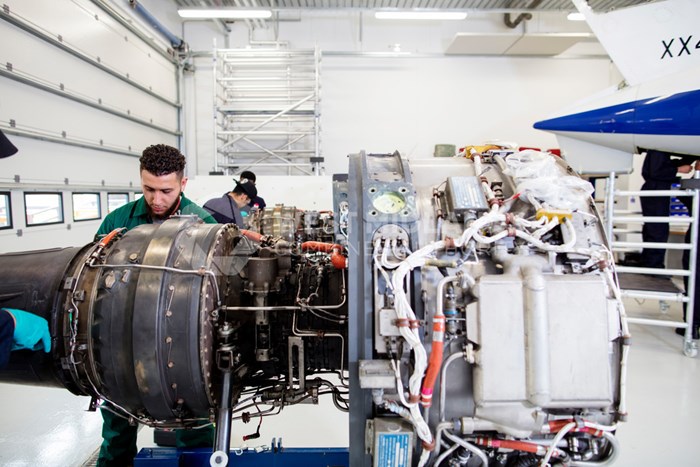Where will you be working a decade from now?
Published: Tuesday 02 May 2023
Social, digital and technological trends are fast changing the way we work and what people actually do for a living.
Research suggests that in 10 years’ time around half of all jobs will be changed by automation as we move towards an increasingly digital, low carbon economy focussed on green industries and new technology.
This shift will demand fresh ideas, critical thinking and constant digital upskilling as people and technology combine to deliver new types of products, services and health care.

Aerospace is one of eight industrial clusters that can help the West Midlands economy soar in the years ahead
So what will the industries of the future look like and what is the West Midlands doing to stay ahead and remain globally competitive?
Most importantly of all, how can local people take advantage of the high-skilled, high-wage jobs being created?
The good news is that after being at the heart of the first industrial revolution, the West Midlands is now home to a new wave of low carbon, 21st century sectors.
Research shows that the West Midlands already boasts the largest emerging technologies cluster outside London and has the highest number of companies in ten out of the 13 tech and creative sector specialisms, including digital transformation, gaming and software development.
The region also has the highest level of Foreign Direct Investment outside the capital and has become a key technology and financial services hub with big names like HSBC, Deutsche Bank and Goldman Sachs moving in. And it has a clear advantage over the rest of the UK when it comes to automotive and transport tech.
Last summer, business and political leaders worked with the West Midlands Combined Authority (WMCA) to build on these strengths and launch the region’s Plan for Growth, designed to ignite eight specific industrial clusters where the West Midlands has a competitive advantage and in which businesses are confident to invest.
The eight clusters are:
- The manufacture of electric vehicles and battery storage devices
- Modern and low carbon utilities such as solar and wind power technology
- The manufacture of the low carbon, factory-built homes of the future
- Professional and financial services
- Health and medical technology
- Aerospace
- Creative content production and video gaming
- Logistics and distribution
The Plan for Growth shows how, with the right interventions, these clusters can be supercharged to help grow the West Midlands economy by more than £3bn, creating up to 45,000 new jobs, many of which will be ‘high value’ jobs.
Average wages of more than £50,000 can be expected in the aerospace and professional and financial services sectors; between £33,000 and £50,000 in the creative content production, video gaming, health and medical technology and electric vehicle manufacturing sectors and up to £33,000 in the logistics and distribution and low carbon housing manufacture sectors.
To help local people learn the right skills to work in these future industries the WMCA is allocating funding from this year’s £154m skills budget to help provide a range of training courses tailored to those industries most in need of workers.
These include retrofit bootcamps teaching people how to install green technologies such as heat pumps, solar panels and super-efficient insulation and digital bootcamps - free, short practical courses designed to prepare businesses or individuals with the knowledge and skills needed to keep pace with new technology.
Julie Nugent, the WMCA’s executive director for economic delivery, skills and communities, said: “Digital is the golden thread running through the 21st century workplace and it will be the bedrock on which the high skilled, high wage economy of the future will be built.
“The Plan for Growth brings together the private and public sectors to set out a clear road map for economic growth that is strong, clean and benefits all our communities.
“The priority is to build on our existing strengths and drive forward investment in these emerging industries, so they generate even more high value jobs and opportunities for local people in the years ahead.
“The WMCA and its public sector partners are helping to lay solid foundations for this growth, investing billions of pounds to build new transport infrastructure, unlock more derelict land for affordable, energy efficient housing and commercial workspaces and to support local people into work by capitalising on our strengths, in particular those future industries that can power a regional and national recovery.”
To find out more about how you can learn the skills needed to work in these industries of the future visit https://www.wmca.org.uk/what-we-do/productivity-and-skills/
Further enquiries
For all other enquiries from members of the public go to our contact us page: https://www.wmca.org.uk/contact-us/
